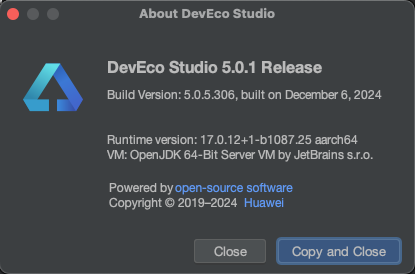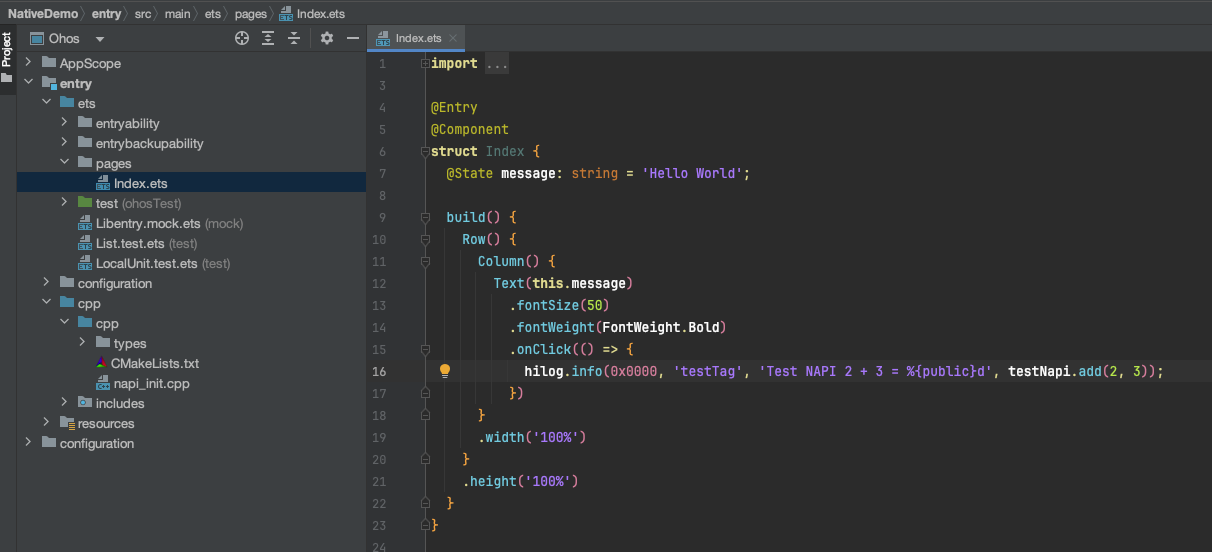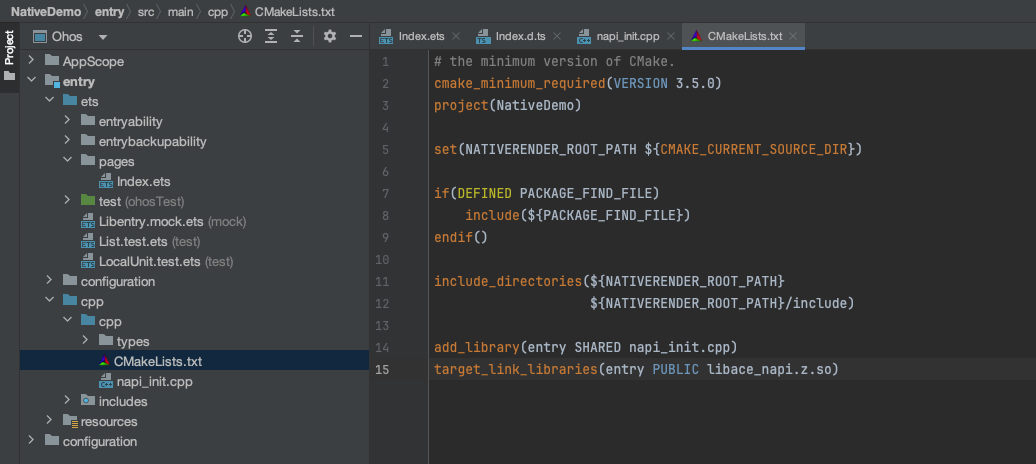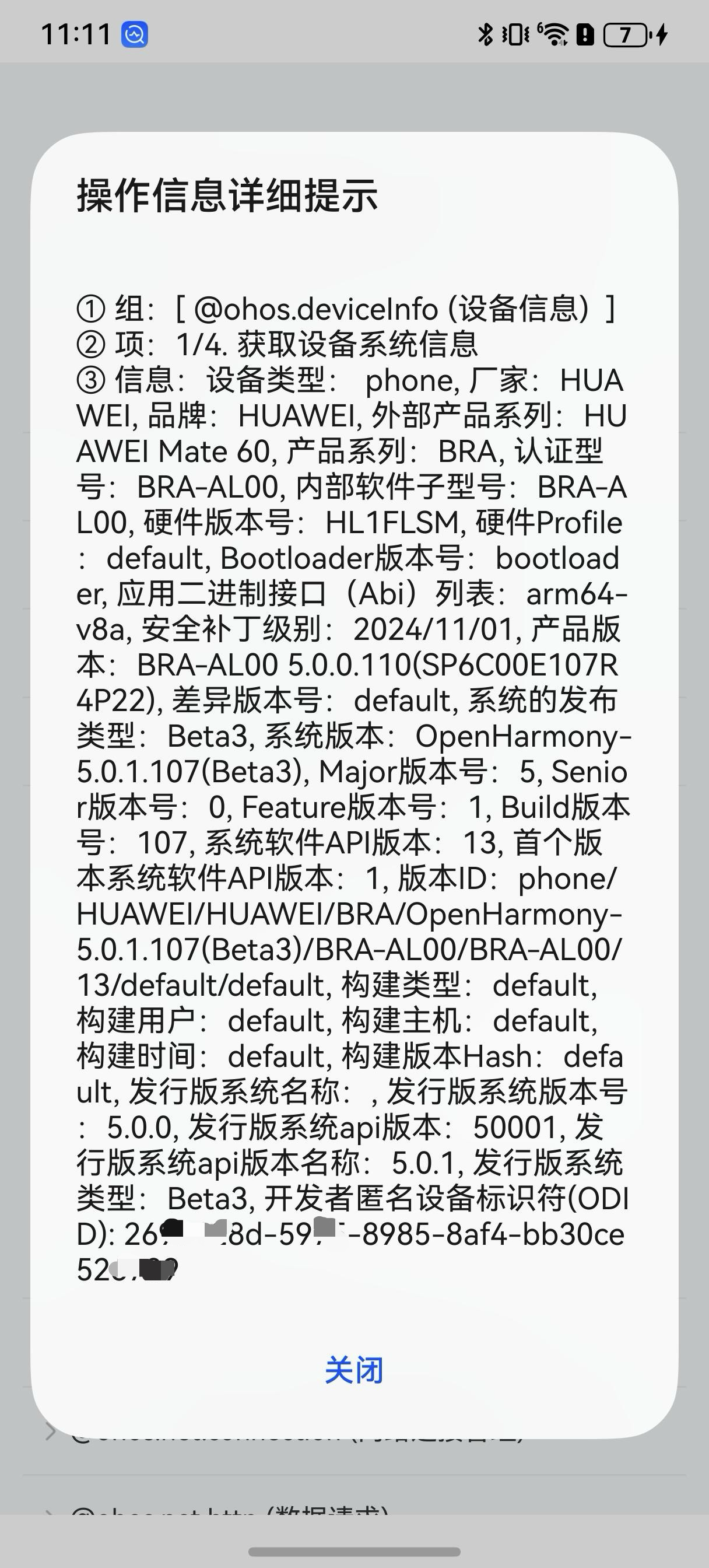在 HarmonyOS 中如何使用 Native C++

环境

- 设备: 支持HarmonyOS NEXT 的设备(真机/模拟器)
创建项目
新建一个项目,选择 [Native C++] 的模版

然后生成一个默认的工程
API 版本 : 5.0.1 (API 13)

分析项目
1 | import { hilog } from '@kit.PerformanceAnalysisKit'; |
分析这个默认工程,根据index.ets代码显示,是在Native下注册是add的计算方法,通过传入两个参数计算和,文中传入了 2 和 3,当点击界面上的Hello world 文本时调用计算方法,日志输出如下
1 | 12-19 55333-55333 A00000/com..../testTag com.xw....lication I Test NAPI 2 + 3 = 5 |
点击16行,testNapi.add() 方法跳过去,在 index.d.ts 中定义了接口方法
1 | export const add: (a: number, b: number) => number; |
这个 testNapi 又是通过 libentry.so 引入的
1 | import testNapi from 'libentry.so'; |
在 CMakeLists 15行 我们可以链接库的地方

接着打开 cpp 目录下的 napi_init.cpp 文件
1 |
|
按照以上的使用流程,接下来实现一个类似的示例
修改项目
以下通过C API 获取设备信息 DeviceInfo
链接
CMakeList.txt
1 |
|
实现
在 napi_init.cpp 里定义一个函数 GetDeviceInfo,实现具体设备信息获取的逻辑
导包
1 |
1 | /** |
配置
1 | EXTERN_C_START |
定义模块
1 | EXTERN_C_END |
注册模块
1 | extern "C" __attribute__((constructor)) void RegisterEntryModule(void) { napi_module_register(&demoModule); } |
定义调用函数
index.d.ts
1 | export const getDeviceInfo: () => string; |
引入
1 | import { getDeviceInfo } from 'libentry.so'; |
调用
1 | val deviceinfo = getDeviceInfo(); |
运行项目
输出
1 | 12-19 11:08:10.384 21645-21645 A03D00/com.../JSAPP com.xw....lication E 设备类型: phone, 厂家:HUAWEI, 品牌:HUAWEI, 外部产品系列:HUAWEI Mate 60, 产品系列:BRA, 认证型号:BRA-AL00, 内部软件子型号:BRA-AL00, 硬件版本号:HL1FLSM, 硬件Profile:default, Bootloader版本号:bootloader, 应用二进制接口(Abi)列表:arm64-v8a, 安全补丁级别:2024/11/01, 产品版本:BRA-AL00 5.0.0.110(SP6C00E107R4P22), 差异版本号:default, 系统的发布类型:Beta3, 系统版本:OpenHarmony-5.0.1.107(Beta3), Major版本号:5, Senior版本号:0, Feature版本号:1, Build版本号:107, 系统软件API版本:13, 首个版本系统软件API版本:1, 版本ID:phone/HUAWEI/HUAWEI/BRA/OpenHarmony-5.0.1.107(Beta3)/BRA-AL00/BRA-AL00/13/default/default, 构建类型:default, 构建用户:default, 构建主机:default, 构建时间:default, 构建版本Hash:default, 发行版系统名称:, 发行版系统版本号:5.0.0, 发行版系统api版本:50001, 发行版系统api版本名称:5.0.1, 发行版系统类型:Beta3, 开发者匿名设备标识符(ODID): 2699128d-5975-8985-8af4-bb30ce52.... |
效果图
